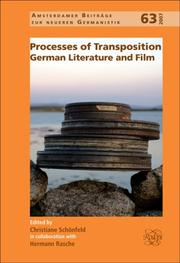| Listing 1 - 5 of 5 |
Sort by
|

ISBN: 9042022841 9789042022843 9401205019 1282265865 1435611845 9781435611849 9789401205016 9781282265868 Year: 2007 Volume: 63 Publisher: Amsterdam New York Rodopi
Abstract | Keywords | Export | Availability | Bookmark
 Loading...
Loading...Choose an application
- Reference Manager
- EndNote
- RefWorks (Direct export to RefWorks)
The essays collected in this book focus on the multi-faceted relationship between German/Austrian literature and the cinema screen. Scholars from Ireland, Great Britain, Germany, Switzerland, Luxembourg, Portugal, USA and Canada present critical readings of a wide range of transpositions of German-language texts to film, while also considering the impact of cinema on German literature, exploring intertextualities as well as intermedialities. The forum of discussion thus created encompasses cinematic narratives based on Goethe’s Faust , Kleist’s Marquise of O ..., Kubrick’s film version of Schnitzler’s Dream Story and Caroline Link’s Oscar-winning adaptation of Stefanie Zweig’s novel Nowhere in Africa . The wide-ranging analyses of the complex interaction between literature and film presented here focus on literary works by Anna Seghers, Hans-Magnus Enzensberger, Nicola Rhon, Günter Grass, Heinrich Böll, Elfriede Jelinek, Rolf Dieter Brinkmann, Erich Hackl, Thomas Brussig, Sven Regener, Frank Goosen and Robert Schneider, as well as on adaptations by filmmakers such as Friedrich Wilhelm Murnau, Max Mack, Josef von Sternberg, Max W. Kimmich, Fred Zinnemann, Paul Wegener, Alexander Kluge, Volker Schlöndorff, Hansjürgen Pohland, Hendrik Handloegten, Michael Haneke, Christoph Stark, Karin Brandauer, Joseph Vilsmaier, Leander Haußmann and Doris Dörrie.
German literature -- Film adaptations. --- Intertextuality. --- Motion pictures -- Germany. --- German literature --- Motion pictures --- Intertextuality --- Music, Dance, Drama & Film --- Film --- Film and video adaptations. --- Criticism --- Semiotics --- Influence (Literary, artistic, etc.)
Book
ISBN: 9783826032417 3826032411 9783826032417 3826032411 9783826032417 Year: 2006 Publisher: Würzburg : Königshausen & Neumann,
Abstract | Keywords | Export | Availability | Bookmark
 Loading...
Loading...Choose an application
- Reference Manager
- EndNote
- RefWorks (Direct export to RefWorks)
Women --- Art and society --- Femmes --- Art et société --- History --- History --- Histoire --- Histoire --- Germany --- Germany --- Allemagne --- Allemagne --- Intellectual life --- History --- Vie intellectuelle --- Histoire
Book
ISBN: 9781571137876 9781571134981 1571134980 Year: 2013 Publisher: Rochester : Camden House,
Abstract | Keywords | Export | Availability | Bookmark
 Loading...
Loading...Choose an application
- Reference Manager
- EndNote
- RefWorks (Direct export to RefWorks)
In the aftermath of the Second World War, both the allied occupying powers and the nascent German authorities sought Germans whose record during the war and the Nazi period could serve as a counterpoint to the notion of Germans as evil. That search has never really stopped. In the past few years, we have witnessed a burgeoning of cultural representations of this "other" kind of Third Reich citizen - the "good German" - as opposed to the committed Nazi or genocidal maniac. Such representations have highlighted individuals' choices in favor of dissenting behavior, moral truth, or at the very least civil disobedience. The "good German's" counterhegemonic practice cannot negate or contradict the barbaric reality of Hitler's Germany, but reflects a value system based on humanity and an "other" ideal community. This volume of new essays explores postwar and recent representations of "good Germans" during the Third Reich, analyzing the logic of moral behavior, cultural and moral relativism, and social conformity found in them. It thus draws together discussions of the function and reception of "Good Germans" in Germany and abroad.
Literature and morals --- German literature --- Germans in literature. --- Germans in motion pictures. --- Identity (Psychology) --- Littérature et morale --- Identité (psychologie) --- History and criticism. --- Histoire et critique. --- Dans la littérature. --- Germany --- Civilization --- Philosophy. --- Littérature et morale --- Identité (psychologie) --- Dans la littérature.
Digital
ISBN: 9781571137876 Year: 2013 Publisher: Suffolk Boydell & Brewer
Abstract | Keywords | Export | Availability | Bookmark
 Loading...
Loading...Choose an application
- Reference Manager
- EndNote
- RefWorks (Direct export to RefWorks)
Thematology --- Literature --- German literature --- Germany
Book

ISBN: 9781782381549 1782381546 9781785338205 178533820X 9781782381532 1782381538 Year: 2015 Publisher: New York Oxford
Abstract | Keywords | Export | Availability | Bookmark
 Loading...
Loading...Choose an application
- Reference Manager
- EndNote
- RefWorks (Direct export to RefWorks)
| Listing 1 - 5 of 5 |
Sort by
|

 Search
Search Feedback
Feedback About UniCat
About UniCat  Help
Help News
News